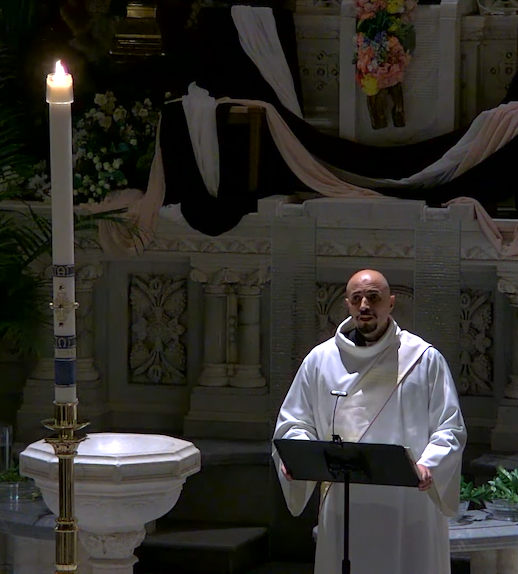A Reflection for the Monday of the Fifth Week of Lent
“As she was being led to execution,
God stirred up the holy spirit of a young boy named Daniel,
and he cried aloud:
‘I will have no part in the death of this woman’” (Dn 13:44-46).
The account of the attempted rape of Susanna in the garden of her Babylonian home, the first reading that the church presents us with today, is much-disputed among scholars. It is not unlike the stories of so many women, and others, who suffer sexual violence. Did it happen at all? Do we believe her version of events? Was she, by choosing to take a bath naked in her own garden, not luring the two trespassing elders who were sexually lusting over her?
Tragically, if poetic to reality, Susanna’s story did not pass muster among some biblical scholars, who deemed it incredible, in the true sense of the word, and not fitting to be included in the scriptural canon. And so this 13th chapter of the book of Daniel is considered apocryphal for much of the Christian and Jewish community. After centuries of argumentation in the Catholic Church, the Council of Trent decreed it canonical along with the rest of the deuterocanonical texts that are today included in our Scriptures.
Will we ever learn to trust what she said, to listen to the voices of the survivor-victims of abuse in all its forms?
While I am not qualified to argue for or against the inclusion of the text in the Christian canon, it appears central to the dispute over the story of Susanna that there are insufficient Jewish Bible sources or manuscripts that include the story of the wife of Joakim. The story appears almost exclusively in Greek texts. Whether or not this is the case, an argument, circa 240 A.D., between two church fathers, Africanus and Origen, offers further light into this scholarly quarrel.
Africanus is firmly against including Susanna in the canon and argues that this part of Daniel is of “spurious” origin. Africanus holds that “this section, although apart from this it is elegantly written, is plainly a more modern forgery.” Origen then responds to Africanus in a treatise-length letter upholding the plausible veracity of the text. And much like Daniel called the elders’ bluff, he argues:
Wherefore I think no other supposition is possible, than that they who had the reputation of wisdom, and the rulers and elders, took away from the people every passage which might bring them into discredit among the people. We need not wonder, then, if this history of the evil device of the licentious elders against Susanna is true, but was concealed and removed from the Scriptures by men themselves not very far removed from the counsel of these elders.
In essence, we could deduce that Origen was an ancient species of a thoroughly modern whistleblower and exposed a dirty cover-up.
The parallels bare a striking resemblance to our time in the aftermath of #MeToo and the ongoing stories of sexual shame and violence in our society and the church. Will we ever learn to trust what she said, to listen to the voices of the survivor-victims of abuse in all its forms? Or will we more quickly cover-up the truth to protect the shame we carry as a society and a church who too often condoned, even promoted, such execrable crimes?
Today’s Scripture shows that society was more easily bent to preserving the status quo of the powerful than to defending the lives of the innocent. I’m not sure we’re much different today. Still, the young Daniel countered the crowd unequivocally. “And He cried aloud: I will have no part in the death of this woman.” Daniel was prepared to sacrifice his hard-won respect in the community to save Susanna, to speak against the dominant vein, to trust that God would protect the innocent. We are called to do the same. I wonder, what might have happened if there had been a Daniel in the crowd at the crucifixion of Jesus?
Correction: An earlier version of this reflection incorrectly stated that only Catholic Bibles feature the story of Susanna and the Book of Daniel.
Get to know Ricardo da Silva, S.J., associate editor
What are you giving up for Lent?
I had great ideas of what I planned to give up and change for Lent, but it all fell apart on the first day this year, and I am struggling to get going again. But I did commit to finally respond to friends and family whose greetings have been piling up in my inbox without reply for months.
Do you cheat on Sundays?
Is this really a thing? I only discovered this reprieve in the Lent contract a few years ago. Wait. Maybe, I can count all the Sundays in Lent where I kept up my promises, to make up for my failed 2022 Lenten observance.
Favorite non-meat recipe
Eggplant Parmigiana—one of the delightful discoveries of living in New York the past few years—but please don’t coat the brinjals (the name we give to eggplant in South Africa) with breadcrumbs.
Favorite Lent chant
Attende Domine (voice only). I sang in a Schola of Gregorian chant at Holy Trinity, the Jesuit parish in Johannesburg, for some years, and this spare and simple chant always captured this season for me. A more recent but similarly haunting refrain for me is “Hold Us in Your Mercy,” a penitential litany by Gary Daigle.
Favorite Easter photo
The first time I chanted the Exsultet, the Easter Proclamation, during the Easter Vigil Mass at the Church of St. Francis Xavier in New York on April 3, 2021.









